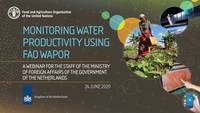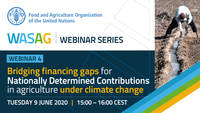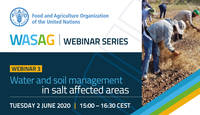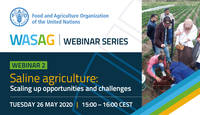Webinars
Understanding the basics of environmental AMR for national action

This first webinar organized in the framework of the “Antimicrobial Resistance in the Environment Webinar Series” is hosted by the Quadripartite, the Food and Agriculture Organization of the United Nations (UNFAO), the United Nations Environment Programme (UNEP), the World Health Organization (WHO) and the World Organisation for Animal Health (WOAH).
This first webinar provides an overview of:
- The basics of environmental AMR including global AMR risk to human and animal health, food systems, ecosystems, livelihoods and economies
- Overarching principles and terminologies, foundational understanding of key sources of environmental AMR and approaches to prevent and control AMR in the environment
- Strategies to strengthen the involvement of the environment in NAPs and processes
WASAG Webinar: Drought, COVID and Multi-Risk Assessment
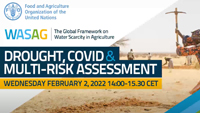
Droughts cause deep and multi-faceted damages to ecosystems, (agro) economies and societies, particularly to vulnerable populations, namely in rural areas worldwide. The global climate crisis, fueled and exacerbated by man-made changes, and the weakening of ecological functions increases the severity of drought events.
Droughts are only one in the bucket of natural and man-made hazards and risks. They have to be understood and addressed from a multi-risk perspective. The ongoing COVID Pandemic is a defining moment for strengthening drought resilience in society and managing ecosystems more sustainably.
The Webinar examined these challenges and aims to improve our understanding of multi-risk assessment starting from the work of WASAG group on “drought”. The Webinar presented an overarching understanding of the linkages through insights from experts on the conceptual framework, research and insights from policies. The Webinar brought together stakeholders from international and multilateral organizations, research institutions, and policy-think tanks, with the common agenda to enhance the multi-risk approaches including drought. The Webinar provided ways forward for the multi-risk assessment framework, and especially to the endeavours of development cooperation to reduce and manage risks in developing countries. The scope for future cooperation and collaboration will be explored.
FAO@ World Water Week 2021: Water tenure and governance: Keys to water and food security

Resilience will only materialize when water balances account for all actual uses. This can only be achieved through coordinated action by actors at different scales and sectors. Participants will engage to understand water tenure, including customary rights, as a key element of water governance, for equitable access to water.
FAO@World Water Week 2021: Real time water data from satellites to achieve faster resilience

Timely access to water data is key for effective adaptive measures. Three practical examples of how open access remote sensing (RS) data can support resilient agricultural systems will be showcased, ranging from water accounting in Karnataka, to sugarcane water productivity, and policy implications of monitoring groundwater use in arid areas.
ADB supports in depth water accounting (WA) in its areas of intervention, where IHE Delft and IWMI deliver spatially disaggregated data and trends in water availability and consumption. The latter are integrated in AQUAMAPS, the FAO global spatial database complementing AQUASTAT. Benefits of the methodology and results of the water accounting in Karnataka, India, are presented.
Sugarcane water productivity in Ethiopia and Mozambique was scrutinized by the “Water Productivity Improvement in Practice” (WaterPIP) project through WaPOR, the FAO portal providing publicly accessible near real time database using satellite data that allows monitoring of agricultural water productivity. Recommendations for improved efficiency at plantation levels were derived from the analysis of water consumption against cropping patterns.
After a first phase of development, the WaPOR portal enters a second phase to promote and support the usage of the RS data at country level. Development of national capacity will further entail creation of applications bringing solutions to country-specific issues. Impact of such applications in Jordan’s policies are documented.
The use of WaPOR data to monitor agricultural production in near real time

This video is a walkthrough that shows how WaPOR data can be accessed in the FAO Hand in Hand platform and used in near-real time to take the pulse of the current growing season by comparing metrics such as biomass production between years. The case study explored here is that of Somalia, a country located in the horn of Africa. The video shows that WaPOR precipitation data, which is derived from remote sensing, captured the late onset of the 2019 rainy season (Gu) in Somalia and consecutively, the low biomass production (plant growth) that followed, which was lower than previous years, even really dry ones.
UNFSS Science Days Side-Event "SOLAW21: Sustainable, Scalable and Dynamic Solutions in land and water management"

In the preparation of the upcoming FAO flagship report on the State of the World’s Land and Water Resources for Food and Agriculture (SOLAW21), a well-known assessment framework using the DPSIR (driver, pressure, state, impact and responses) shows how to address the challenges of scarcity of water and degradation of land and soil resources, that threaten our food security.
A focus on prioritized actions through carefully designed responses must be effective and that fully considers potential trade-offs and synergies between agriculture and other ecosystem services, as well as appropriate investments in sustainable land, soil and water management to mitigate and adapt to climate change and natural resource degradation.
In this side-event “SOLAW21: Sustainable, Scalable and Dynamic Solutions in land and water management towards Food System Transformation” organized in the framework of the UN Food Summit Science Days Side Event on 7 July 2021, SOLAW 2021 Contributors speak on land, soil and water linkages.
We also hear from FAO Regional and Decentralized Officers who facilitated inputs from the field through the DPSIR Framework key questions and findings, along with partners from the Philippines on how the SOLAW 2021 data and information can bring new knowledge and focus on priority response actions, and whether they need to be scaled up for further investments.
This side event also hopes to spark discussions on the need for simple and friendly tools at the local, regional and global levels that can bring us together in finding common solutions.
Publication date: 7 July 2021
Global Agro-Ecological Zones Version 4 Official Launch
This webinar launches the new Global Agro-Ecological Zones platform version 4 (GAEZ v4), and demonstrates the functionality of the platform in the context of sustainable development. The GAEZ v4 Model Documentation and User’s Manual are presented as well as User Cases.
More information at: www.fao.org/geospatial/en/
Publication date: 17 June 2021

How can we produce food and take action for climate and natural resources?
Nature-based Solutions in agriculture are a critical solution for positive change. Farmers, ranchers, and food producers are on the frontlines of climate change, and play an important role in developing and implementing solutions. When deployed properly, Nature-based Solutions can provide a triple benefit: improving the productivity and resilience of agriculture, mitigating and adapting to climate change, and enhancing nature and biodiversity.
FAO and The Nature Conservancy collaborated to explore the potential of Nature-based Solutions (NbS) in the much-needed transformation of our food systems, delivering nutrition for people while restoring nature and the climate. This collaboration has generated three reports addressing NbS in agricultural production systems: 1) A literature review on the state of the science; 2) A policy brief on the case and pathways for adoption; and 3) A finance guide for identifying and creating investable projects.
Publication date: 15 February 2021

FAO-OECD Roundtable on Financing Agricultural Water
The 7th meeting of the Roundtable on Financing Water was a thematic meeting focused on financing agricultural water organised in partnership with the OECD and the U.N. Food and Agriculture Organization (FAO). This meeting supported the OECD’s broader work on financing water as well as FAO's strategic priorities on promoting investments in agricultural water (and update on the development of the new Strategic Framework) that contribute to sustainable water management, food security, and sustainable development more broadly.
Publication date: 8 February 2021
Water and Environment: Second expert workshop on environmental flows
Video interviews of world recognized experts on various technical, scientific and policy-related aspects of the assessment of environmental flows, recorded for the Second expert workshop on environmental flows.
Publication date: 1 November 2020
https://www.youtube.com/watch?v=Hng0wI7DEkQ&feature=youtu.be
FAO Adaptation Fund Technical Webinar "Nature & Agriculture: Pathways to finance and scale nature-based solutions"
Nature plays a key role in addressing adaptation challenges. Nature-Based Solutions (NbS) in conservation agriculture can provide healthy ecosystems that yield multiple benefits. FAO and The Nature Conservancy (TNC) are moving beyond research to address the potential for higher rate of adoption of agriculture- and nature-based solutions (Ag-NbS) through the development of financing at scale, from source water protection to soil health, carbon mitigation, water quality improvement, wetland protections, and fisheries and biodiversity benefits. Ag-NbS are core to providing win-win scenarios that not only enable sustainable agriculture production systems but also address the Global Green Deal. Improved resource efficiency and resilience are show-cased in this webinar combined with food security and rural livelihoods support, while addressing net-zero environmental impacts and climate change mitigation and adaptation. A series of guides to assist countries in capturing Ag-NbS for adaptation to climate change and conservation of land, water and biodiversity, and to allow for cumulative assessment of benefits, valuation and policy priorities to unlock investment, are shared through findings from the joint FAO-TNC project, and opportunities for developing investable Ag-NbS projects for sustainable agriculture are discussed.
Publication date: 29 October 2020
FAO Adaptation Fund Technical Webinar "NASA SERVIR: Connecting from Space to Village
In the face of climate change, improving the sustainable management of groundwater, thanks to better understanding and continuous monitoring, is more than ever needed. Measuring changes and observing the ongoing dynamics of groundwater resources represent not only an effective strategy to respond to the increasing scarcity of resources, but also a key approach to increase local communities' adaptive capacity and resilience to climate variability and natural climatic phenomena. GRACE is an international cooperative US-German dual-minisatellite SST (Satellite-to-Satellite Tracking) geodetic mission with the objective to obtain long-term data with unprecedented accuracy for global (high-resolution) models of the mean and the time-variable components of the Earth's gravity field. GRACE is also part of NASA's Earth System Science Pathfinder program (ESSP). The NASA-DLR (German space agency) GRACE mission allows the detection and monitoring groundwater changes from space. As changes in the gravimetric field are indicative of changes in groundwater, GRACE provides more than 10 year-long data records for scientific analysis. This information is critical to water, agriculture and urban planners and managers.
Publication date: 7 October 2020
Scaling resilient water and agriculture management practices for Sustainable Rice Intensification in East Africa
The webinar was organized in the framework of the research project, scaleWAYS (Scaling out Resilient Water and Agricultural Systems), which is jointly being implemented by the International Institute for Applied System Analysis (IIASA), the Lake Victoria Basin Commission (LVBC) and the International Crops Research Institute for Semi-Arid Tropics (ICRISAT) with financial support from the Austrian Development Agency (ADA).
Publication date: 15 September 2020
WWWeek At Home 2020: “Evading Food and Water Crises in the COVID Era”
The catastrophe caused by the global COVID-19 pandemic has greatly impacted human wellbeing and particularly vulnerable populations at local, regional and internationally-connected scales. A new report by the UN’s Food and Agriculture Organization (FAO) and World Food Programme (WFP) suggest that at least 27 countries are facing a COVID-19-driven food crisis. In addition, the global sewage surveillance of SARS-CoV-2 has the potential to provide a view of trends in community infection while public health struggles to monitor individuals and obtain good data to support social distancing and economic reopening policy decisions. The solutions to these issues will require global cooperation.
Publication date: 27 August 2020
WWWeek At Home 2020: “Sustainable Oases Initiative”
This event provides an overview of how climate change affects different types of oasis ecosystems and presentes sustainable strategies to limit the degradation of these vulnerable areas. Results from, amongst others, the project “Revitalization of oasis agroecosystems through a sustainable, integrated landscape approach in Morocco (OASIL Project) and the Globally Important Agricultural System (GIAHS) program were presented and discussed.
Publication date: 24 August 2020
WWWeek At Home 2020: “Tenure Approaches for Securing Rights and Advancing Climate Resilience”
Secure and equitable frameworks governing water tenure—relationships between water users at all levels—are a fundamental component of sustainable and climate-resilient water management. This event will showcase efforts by FAO, RRI, and ELI to define and assess water tenure around the world, drawing on country-level experiences. Water tenure—relationships between individuals, communities, governments, and private entities with respect to water—encompasses a bundle of statutory and/or customary water rights. Understanding how water tenure regimes are legally defined, implemented, and protected in practice is fundamental to sustainable and equitable water management. Particularly for vulnerable populations and women, legally secure water tenure rights are essential to improving livelihoods, food security, and gender equality, and are important determinants of climate resilience.
Publication date: 24 August 2020
WWWeek At Home 2020: “Freshwater for Food and Nutrition Security in SIDS”
The remotely located Small Island Developing States (SIDS) face a raft of challenges to sustain their food security. SIDS fragilities come to the fore during the Covid-19 pandemic when transport lines are blocked, tourist revenues drop to nil and expected remittances are delayed. Islands’ resilience is tested in the coming decades when extreme weather events might create great difficulties. Self-sufficiency in healthy foods is widely advocated by international organizations and SIDS governments. Yet, timely delivery of fresh water for crop cultivation cannot be taken for granted. In a multidisciplinary study FAO and the Vrije Universiteit Amsterdam, answer the question ‘How can fresh water management serve Food and Nutrition Security on SIDS?’ An empirical reconnaissance contextualized the study objective while a water governance component capitalized on lessons learned. A synthesis of findings constitutes the basis for a road map on water governance that ensures FNS for SIDS.
Publication date: 24 August 2020
Webinar on “Youth Innovation in Land, Soil and Water"
The engagement of youth and young professionals plays a key role achieving the Sustainable Development Goals (SDGs). Today's youth are more geographically mobile and technologically connected than any other generation. Moreover, they hold a capital of innovative and scalable solutions and ideas that are often overlooked. In the context of COVID-19 pandemic, intergenerational exchange and cooperation is even more crucial to bridge past experiences with innovative ideas, driving the creation of holistic solutions. The session delivers lightning talks from young professionals on how youth and innovation go hand in hand to deliver solutions, on land, soil and water resources management, for a sustainable tomorrow.
Publication date: 23 July 2020
Webinar on "Water Productivity Improvements – A Silver Bullet for the Climate Crisis?”
This webinar discusses the potential and limitations of water productivity interventions in helping water managers (from the farm to the basin level) to deal with growing scarcity due to climatic and other changes.
Publication date: 14 July 2020
Webinar on “Pandemics/Epidemics, Drought and Agriculture: Building back better”
This webinar presents the pathways through which drought vulnerable groups have been hit by COVID-19 and left behind during the lockdown. It raises the point that they must not also be left out of the global green recovery. It highlihgts the options and policy recommendations for an inclusive green recovery, the ways to identify and mitigate the unintended economic and health consequences of the COVID-19 response and how to include drought vulnerable groups in COVID-19 decision-making and management by ensuring targeted messaging reaches all drought vulnerable groups.
Publication date: 10 July 2020
Webinar on "Monitoring water productivity in agriculture using FAO WaPOR”
This webinar organized by FAO for the staff of the Ministry of Foreign Affairs of the Government of The Netherlands, presents how WaPOR, FAO’s portal to monitor Water Productivity through Open-access of Remotely sensed derived data, allows to calculate and distribute key data for monitoring and understanding water use in agriculture, providing governments with reliable information to support decisions and targeted interventions on more efficient use of water.
Publication date: 24 June 2020
Webinar on “Water & Nutrition: From Research to Action”
Water use in agriculture is fundamental for both food security and rural livelihoods, but also supports improved nutrition through many pathways; in tandem with water uses in other sectors, notably WASH. This webinar describes the important linkages between water and nutrition, and the importance of synergistic water-nutrition strategies for improved well-being and planetary health. A distinguished panel describe the key linkages between water use and nutrition as well as the impacts from unsustainable consumption for the world’s water resources, present examples of implementation of water-sensitive nutrition interventions and develops policy actions in the water-nutrition space that are even more urgently needed as a result of Covid-19.
Publication date: 23 June 2020
Webinar on "RECSOIL: Recarbonization of global soils"
To celebrate the World Day to Combat Desertification and Drought, FAO's Global Soil Partnership organized a webinar on "RECSOIL: Recarbonization of global soils".
The webinar discusses the feasibility of moving the SOC agenda into action and how RECSOIL can contribute to it.
Publication date: 17 June 2020
Webinar on "Collaboration on Promoting Quinoa (Part 1)"
Quinoa, which has high nutrient content and adaptability to various marginal conditions has been identified by various organizations as a food that has vital role to play in the realization of food and nutrition security globally.
With the threats of climate change, it is extremely important to cultivate salt and drought tolerant crops such as quinoa to enhance climate-smart agriculture. WASAG, in collaboration with ICBA and CIRAD, is coordinating international efforts towards extended quinoa production. Through this webinar, the biodiversity of quinoa, germplasm improvement suitable for marginal environments as well as the emerging opportunities in quinoa production were discussed.
Publication date: 15 June 2020
Webinar on "Bridging financing gaps for Nationally Determined Contributions in agriculture under climate change"
This webinar organized by The Global Framework on Water Scarcity in Agriculture (WASAG) hosted by the FAO Land and Water Division was an opportunity to share the WASAG’s Framework on Financing Mechanisms. This Framework aims to identify and support new approaches to finance water for agriculture. These approaches will inform the work undertaken in the WASAG working groups to ensure an aligned approach across WASAG projects and activities. The webinar presents the framework and a number of case studies illustrating how it can be utilized.
Publication date: 9 June 2020
Webinar on "Soil and water management in salt affected areas: practical solutions and tools"
This webinar organized by The Global Framework on Water Scarcity in Agriculture (WASAG), aims at understanding the major issues and the role that tailored soil management and irrigation techniques can play in ensuring food security in such areas. The webinar brings together irrigation practitioners from around the world to showcase solutions and tools provided by their experience. Some of the key aspects of the dialogue focuses on global projects related to the practice of irrigation with brackish or saline waters, as well as innovative approaches and solutions in managing saline soils. Under the COVID-19 pandemic, unprecedented challenging conditions push the attention on how local food production can be enhanced by utilizing low-quality water and land resources, such as in salt-affected soils.
Publication date: 2 June 2020
Webinar on "Saline Agriculture: Scaling up Opportunities and Challenges"
The Global Framework on Water Scarcity in Agriculture (WASAG) hosted by the FAO Land and Water Division held its second webinar on "Saline Agriculture: Scaling up Opportunities and Challenges". The objective of the webinar was to share knowledge and experience on global projects related to saline farming, as well as smart digital approaches and solutions
Under the COVID-19 pandemic, unprecedented challenging conditions push focus on how the local food production could be enhanced by utilizing low-quality water and land resources, such as brackish groundwater and salt-affected soils.
Publication date: 26 May 2020
Webinar on "Soil Biodiversity: a nature-based solution?"
FAO's Global Soil Partnership (GSP) is organizing its first webinar on Soil Biodiversity as part of the annual campaign dedicated to soil biodiversity with the theme “Keep soil alive, protect soil biodiversity”.
This webinar aims to discuss the global status, gaps and multiple benefits of soil biodiversity as a key contributor in sustaining life in this planet.
Publication date: 22 May 2020
Webinar on "The implementation of the Code of Conduct for the Sustainable Use and Management of Fertilizers"
The implementation of the Code of Conduct for the Sustainable Use and Management of Fertilizers webinar was held on 19th, May 2020. The webinar addressed the importance of the continuous effort to raise awareness on fertilizers as a means to improve production and productivity. The main goal consists of further dissemination, implementation & distribution of the code to overcome the barriers to effectively implement the fertilizer code in a holistic approach to sustainable soil management and strengthen the policy environment.
Publication date: 19 May 2020
Webinar on "Water scarcity, abundance of women?"
The webinar on “Water Scarcity, an Abundance of Women?” was organized by The Global Framework on Water Scarcity in Agriculture (WASAG) hosted by the FAO Land and Water Division, in collaboration with its Partner. This webinar, which welcomed nearly 200 participants from 44 countries, tackled the vital topic of gender in water scarcity.
Publication date: 12 May 2020
Webinar on “Healthy ecosystems for healthy life: the UN Decade on Ecosystem Restoration 2021-2030”
Today, more than ever we are searching for a sustainable future, where practices towards a healthy, Green+Blue planet will make life and the environment more resilient and beneficial to all. Harmonizing humans and the environment is an urgent need. Restoration of all types of ecosystems can make a great contribution to it. It’s a major challenge, but also an opportunity. The seminar reviews these challenges and opportunities ahead of us.
Publication date: 22 April 2020
Webinar on "Lessons from COVID-19 for One Water One Health"
Based on the Manhattan and Berlin principles, FAO’s seminar presents an integrated multi-sectoral approach to integrated water resources management under the One Water One Health concept of water, reflected in the Sustainable Development Goal (SDG) 6 - Ensure availability and sustainable management of water and sanitation for all.
Publication date: 15 April 2020
Webinar on "RECSOIL: Recarbonization of Global Soils"
This seminar presents the RECSOIL initiative, an innovative tool designed to address the key challenges humanity faces today within an enabling framework integrated by a series of institutions and commitments related to sustainable soil management, climate change and sustainability.
Publication date: 7 April 2020
Webinar on "Water productivity, the yield gap and nutrition: the case of Ethiopia"
FAO Land and Water Division presents the webinar on “Water productivity, the yield gap and nutrition: the case of Ethiopia” in observance of World Food Day. This webinar aims to increase the understanding of the links between water, food security, nutrition and livelihoods of smallholder farmers.
In the context of water scarcity, the webinar presents a framework to assess options to increase yields and produce more high-nutrient dense food, based on the results of a country case study in Ethiopia.
Publication date: 16 October 2019
E-learning course on "SDG Indicator 6.4.1 - Change in water-use efficiency over time"
The course provides guidance on the rationale and the main characteristics of Indicator 6.4.1, and on how to compute the two dimensions constituting the indicator: the hydrologic and the economic component. It also highlights possible challenges related to data availability, and the impact that monitoring results may have on national decision-making and identification of development policies.
Publication date: August 2019
Webinar on "AQUASTAT: Accounting water for the SDG 6.4 indicators"
Virginie Gillet, Land and Water Office in FAO Headquarters, presents the AQUASTAT Programme, including the available data and the updated methodology. The annual questionnaire on water and agriculture is also detailed as part of the data collection through the recently established AQUASTAT National Correspondents network. The webinar was recorded as part of a series on Water Accounting organized by the FAO Near East and North Africa Regional Office.
Publication date: August 2019
E-learning course on "SDG Indicator 6.4.2 - Level of water stress"
English | Français | Español | Russian
This course provides tools, methods and processes to support countries in monitoring and reporting on SDG Indicator 6.4.2 "Level of water stress: freshwater withdrawal in percentage of available freshwater resources".
Publication date: January 2018
Tutorials on WaPOR
Watch the series of tutorials on WaPOR, FAO’s portal to monitor Water Productivity through Open-access of Remotely sensed derived data.
Publication date: from May 2017
Tutorials on AquaCrop
Watch the series of tutorials on AquaCrop, FAO’s crop water productivity model.
Publication date: April 2016













